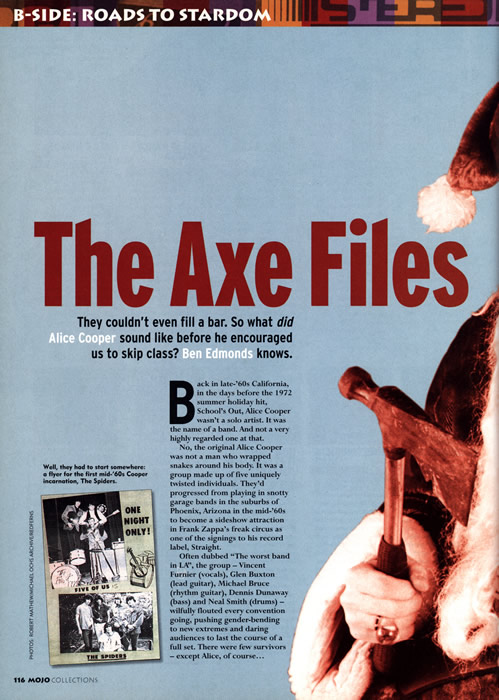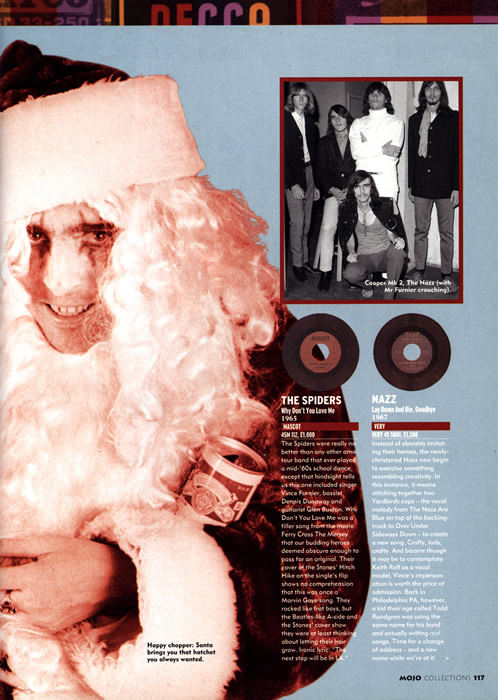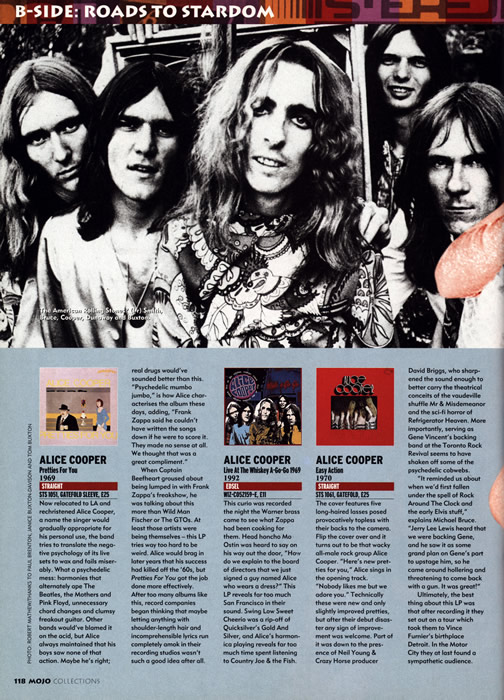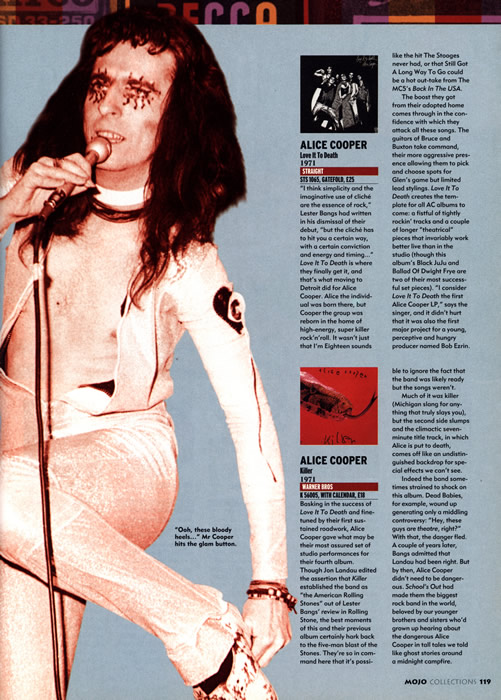Article Database

Mojo
2001
The Axe Files
Author: Ben Edmonds
They couldn't even fill a bar. So what did Alice Cooper sound like before he encouraged us to skip class? Ben Edmonds know.
Back in late-'60s California, in the days before the 1972 summer holiday hit, School's Out, Alice Cooper wasn't a solo artist. It was the name of a band. And not a very highly regarded one at that.
No, the original Alice Cooper was not a man who wrapped snakes around his body. It was a group made up of five uniquely twisted individuals. They'd progressed from playing in snotty garage bands in the suburbs of Phoenix, Arizona in the mid-'60s to become a sideshow attraction in Frank Zappa's freak circus as one of the signings to his record label, Straight
Often dubbed "The worst band in LA", the group - Vincent Furnier (vocals), Glen Buxton (lead guitar), Michael Bruce (rhythm guitar), Dennis Dunaway (bass) and Neal Smith (drums) - wilfully flouted every convention going, pushing gender-bending to new extremes and daring audiences to last the course of a full set. There were few survivors - excerpt Alice, of course...
The Spiders
Why Don't You Love Me Now
1965 - Mascot - 45M 112, £1,000
The Spiders were really no better than any other amateur band that ever played a mid='60s school dance, except that hindsight tells us this one included singer Vince Furnier, bassist Dennis Dunaway and guitarist Glen Buxton. Why Don't You Love Me was a filler song from the movie Ferry Cross The Mersey that out budding heroes deemed obscure enough to pass for an original. Their cover of the Stones' Hitch Hike on the single's flip shows no comprehension that this was once a Marvin Gaye song. They rocked like frat boys, but the Beatles-like-A-side and the Stones' cover show they were at least thinking about letting their hair grow. Ironic lyric: "The next stop will be in LA."
The Nazz
Lay Down and Die, Goodbye
1967 - Very - Very 45 S001, £1,500
Instead of slavishly imitating their heroes, the newly-christened Nazz now begin to exercise something resembling creativity. In this instance, it means stitching together two Yardbirds cops - the vocal melody from The Nazz Are Blue on top of the backing-track to OVer Under Sideways Down - to create a new song. Crafty, lads, crafty. And bizarre though it may be to contemplate Keith Relf as a vocal model, Vince's impersonation is worth the price of admission. Back in Philadelphia PA however, a kid their age called Todd Rundgren was using the same name for his band and actually writing real songs. Time for a change of addess - and a new name while we're at it.
Alice Cooper
Pretties For You
1969 - Straight - STS 1051, Gatefold Sleeve, £25
Now relocated to LA and rechristened Alice Cooper, a name the singer would gradually appropriate for his personal use, the band tries to translate the negative psychology of its live sets to wax and fails miserable. What a psychedelic mess: harmonies that alternately ape The Beatles, the Mothers and Pink Floyd, unnecessary chord changes and clumsy freakout guitar. Other bands would've blamed it on the acid, but Alice always maintained that his boys saw none of that action. Maybe he's right, real drugs would've sounded better than this. "Psychedelic mumbo jumbo," is how Alice characterises the album these days, adding, "Frank Zappa said he couldn't have written the songs down if he were to score it. They made no sense at all. We thought that was a great compliment."
When Captain Beefheart groused about being lumped in with Frank Zappa's freakshow, he was talking about this more than Wild Man Fischer or The GTOs. At leasat those artist were being themselves - this LP tries way too hard to be weird. Alice would brag in later years that his success had killed off the '60s, but Pretties For You got the job done more effectively. After too many albums like this, record companies began thinking that maybe letting anything with shoulder-length hair and imcomprehensible lyrics run completely amok in their recording studios wasn't such a good idea after all.
Alice Cooper
Live At The Whiskey A-Go-Go
1992 - Edsel - WIZ-C052159-E, £11
This curio was recorded the night the Warner brass came to see what Zappa had been cooking for them. Head honcho Mo Ostin was heard to say on his way out the door, "How do we explain to the board of directors that we just signed a guy named Alice who wears a dress?" This LP reveals far too much San Francisco in their sound. Swing Low Sweet Cheerio was a rip-off of Quicksilver's Gold and Silver, and Alice's harmonica playing reveals far too much time spent listening to Country Joe & the Fish.
Alice Cooper
Easy Action
1970 - Straight - STS 1061, Gatefold, £25
The cover features five long-haired lasses posed provocatively topless wiht their backs to the camera. Flip the cover over and it turns out to be that wacky all-male rock group Alice Cooper. "Here's new pretties for you," Alice sings in the opening track. "Nobody likes me but we adore you." Techinally these were new and only slightly improved pretties, but after their debut disaster any sign of improvement was welcome. Part of it was down to presence of Neil Younh & Crazy Horse producer David Briggs, who sharpened the sound enough to better carry the theatrical conceits of the vaudeville shuffle Mr & Misdemeaner and the sci-fi horror of Refridgerator Heaven. More importantly, serving as Gene Vincent's backing band at the Toronto Rock Revival seems to have shaken off some of the psychedelic cobwebs.
"It reminded us about when we'd first fallen under the spell of Rock Around The Clock and the early Elvis stuff," explains Michael Bruce. "Jerry Lee Lewis heard that we were backing Gene, and he saw it as some grand plan on Gene's part to upstage him, so he came around hollering and threatening to come back with a gun. It was great!"
Ultimately, the best thing about his LP was that after recording it they set out on tour whihc took them to Vince Furnier's birthplace Detroit. In the Motor City they at least found a sympathetic audience.
Alice Cooper
Love It To Death
1971 - Straight - STS 1065, Gatefold, £25
"I think simplicity and the imaginative us of cliché are the essence of rock," Lester Bangs had written in his dismissal of their debut, "but the cliché has to hit you a certain way, with a certain conviction and energy and timing..." Love It To Death is where they finally get it and that's what moving to Detroit did for Alice Cooper. Alice the individual was born there, but Cooper the group was reborn in the home of high-energy, super killer rock'n'roll. It wasn't just that I'm Eighteen sounds like the hit The Stooges never had, or that Still Got A Long Way To Go could be a a hot out-take from The MC5's Back In The USA.
The boost they got from their adopted home comes through in the confidence with which they attack all these songs. The guitars of Bruce and Buxton take command, their more aggressive presence allowing them to pick and choose spots for Glen's game but limited lead stylings. Love It To Death creates the template for all AC albums to come: a fistful of tightly rockin' tracks and a couple of longer "theatrical" pieces that invariably work better live then in the studio (though this album's Black Juju and Ballad Of Dwight Fry are two of their most successful set pieces). "I consider Love It To Death the first Alice Cooper LP," says the singer, and it didn't hurt that it was also the first major project for a young, perceptive and hungry producer named Bob Ezrin.
Alice Cooper
Killer
1971 - Warner Bros - K 56005, with Calander, £18
Basking in the success of Love It To Death and fine-tuned by their first sustained roadwork, Alice Cooper gave what may be their most assured set of studio performances for their fourth album. Though Jon Landau edited the assertion that Killer established the band as "the American Rolling Stones" out of Lester Bangs' review in Rolling Stone, the best moments of this and their previous hark back to the five-man blast of the Stones. They're so in command here that it's possible to ignore the fact that the band was likely ready but the songs weren't.
Much of it was killer (Michigan slang for anything that truly slays you), but the second side slumps and the climatic seven-minute title track, in which Alice is put to death, comes off like an undistinguished backdrop for special effects we can't see.
Indeed the band sometimes strained to shock on this album. Dead Babies, for example, would up generating only a middling controversy: "Hey, these guys are theatre, right?" With that, the danger fled. A couple years later, Bangs admitted that Landau had been right. But by then, Alice Cooper didn't need to be dangerous. School's Out had made them the biggest rock band in the world, beloved by our younger brothers and sisters who'd grown up hearing about the dangerous Alice Cooper in tall tales we told like ghost stories around a midnight campfire.
(Originally appeared in Mojo Collections magazine, Spring 2001)






